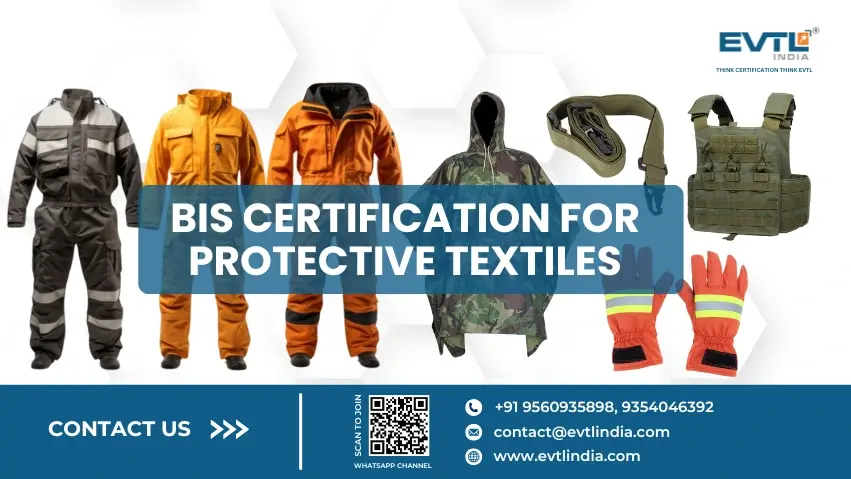Protective textiles are a specialized category within the broader technical textiles industry and play a vital role in safeguarding individuals from various hazardous conditions. These textiles are carefully engineered to protect users from risks posed by environmental hazards such as heat, cold, and UV rays, as well as more specific threats like chemical exposure, radioactive radiation, and even ballistics. For these textiles to provide optimal protection, they must adhere to strict quality and safety standards established by the Bureau of Indian Standards (BIS). BIS certification ensures that protective textiles meet these requirements, assuring users of their reliability and effectiveness.
Understanding BIS and Its Role
The Bureau of Indian Standards (BIS) is India’s national standardization body responsible for formulating and enforcing standards for products across various sectors. Through a comprehensive certification process, BIS ensures the quality, stability, and safety of products entering the market. One of its key initiatives is the ISI Mark certification scheme, which allows manufacturers to obtain a BIS license to display the ISI mark on products that comply with relevant Indian standards.
This certification is crucial for manufacturers looking to market their products in India, as it signifies compliance with established safety and quality benchmarks. The process involves rigorous scrutiny, including laboratory testing and on-site inspections, to verify that the product meets all applicable standards.
BIS certification for protective textiles is important due to their life-saving applications. Products bearing BIS certification and the ISI mark builds confidence in users regarding their durability and protective capabilities, thereby ensuring public safety and fostering consumer trust.
The Importance of BIS Certification for Protective Textiles
Protective textiles serve a diverse range of applications, often functioning in high-risk environments. These include industrial settings, firefighting operations, welding processes, and military use. Examples of protective textiles are curtains and drapes, gloves, high-visibility clothing, bullet-resistant jackets, and tactical equipment. Each of these applications demands adherence to precise standards to ensure the user’s safety.
Without proper BIS certification, protective textiles may fail to meet the necessary safety criteria, putting lives and property at risk. For instance, a firefighter’s protective clothing must effectively resist flames and heat, while bullet-resistant jackets must meet stringent ballistic performance requirements. BIS certification ensures that these products are tested and verified for their intended purposes, thereby mitigating risks associated with substandard or uncertified materials.
Key Standards for Protective Textiles
To standardize protective textiles, BIS has developed a comprehensive set of Indian Standards tailored to various applications. These standards cover everything from material resistance to specific performance requirements:
Each standard addresses the unique challenges of specific protective textile applications. For instance, IS 15742:2007 focuses on clothing made from flame-resistant materials, while IS 16655:2017 specifies requirements for welding protective clothing. By adhering to these standards, manufacturers ensure that their products perform as intended in critical scenarios.
Process of BIS Certification for Protective Textiles
Obtaining BIS certification for protective textiles involves several steps, each designed to validate the product’s compliance with Indian standards:
1. Application Submission: Manufacturers must submit an application form along with required documentation to BIS.
2. Documentation Review: BIS reviews the submitted documents to ensure completeness and correctness.
3. Factory Inspection: BIS officials conduct an on-site inspection of the manufacturing facility to assess the production process and quality control measures.
4. Sample Testing: Product samples are taken and tested in BIS-approved laboratories to verify compliance with Indian standards.
5. Certification Grant: Upon successful completion of the inspection and testing, BIS grants certification, allowing the manufacturer to use the BIS mark on their products.
Documents Required for BIS Certification
To apply for BIS certification, manufacturers need to submit the following documents:
Application form
Manufacturing process details
Quality control plan
Test reports from BIS-approved laboratories
Factory layout and equipment details
Proof of business registration
Product specifications and technical details
Declaration of conformity to Indian standards
Additionally, manufacturers may be required to provide proof of compliance with environmental and safety regulations, depending on the specific type of product being certified.
Applications of BIS-Certified Protective Textiles
Protective textiles find use in a variety of fields where safety is paramount. Some prominent applications include:
Industrial Safety: Protective clothing and gloves designed for industrial workers shield against heat, flames, and chemical exposure.
Firefighting Gear: High-performance textiles for firefighters are tested to resist extreme heat and flames, ensuring their safety during emergencies.
Welding Processes: BIS-certified textiles for welding provide protection from sparks, molten metal, and intense heat.
Military and Tactical Use: Bullet-resistant jackets, tactical slings, and ammunition pouches are essential for defense personnel, offering protection in combat scenarios.
Visibility and Weather Protection: High-visibility garments and waterproof rain ponchos cater to safety needs in adverse weather conditions or low-light environments.
By ensuring BIS certification for these applications, manufacturers contribute to creating a safer environment for workers and end-users.
Benefits of BIS Certification
BIS certification offers several advantages for both manufacturers and consumers.
For Manufacturers: The ISI mark enhances brand reputation and facilitates market access in India. It also minimizes the risk of product recalls or legal liabilities arising from substandard goods.
For Consumers: BIS-certified products provide assurance of safety, durability, and compliance with Indian standards. Consumers can trust that these products meet the highest quality benchmarks.
Moreover, certification fosters trust between stakeholders, promoting a culture of safety and reliability in industries where protective textiles are indispensable.
Conclusion
Protective textiles are indispensable in today’s world, offering safety and security in various high-risk environments. However, their effectiveness hinges on adherence to stringent quality and safety standards. BIS certification serves as a cornerstone for ensuring that protective textiles meet these requirements, providing assurance to users about their reliability and performance.
By obtaining BIS certification, manufacturers not only comply with Indian regulations but also reinforce their commitment to quality and safety. For consumers, the ISI mark signifies trust, ensuring that the products they rely on are built to protect. As industries continue to innovate in the field of protective textiles, the role of BIS certification remains pivotal in upholding standards and safeguarding lives.





















